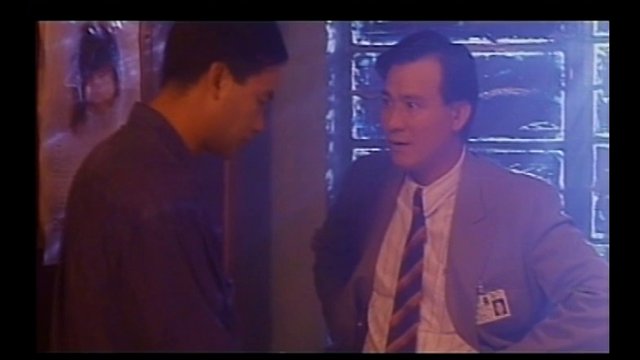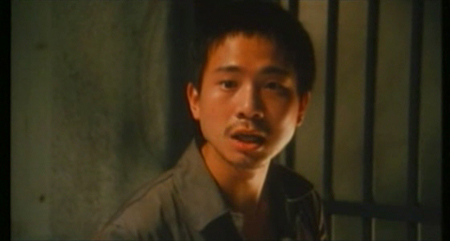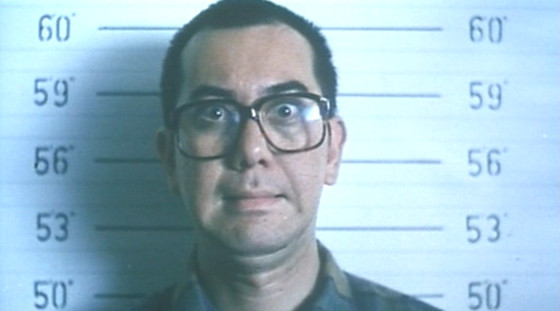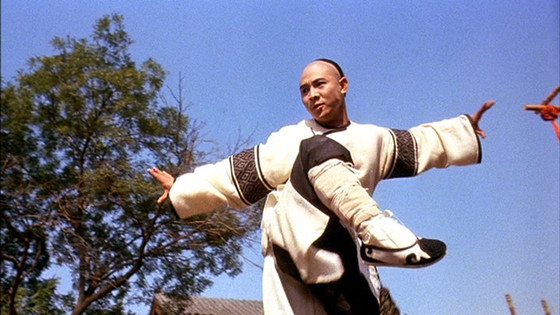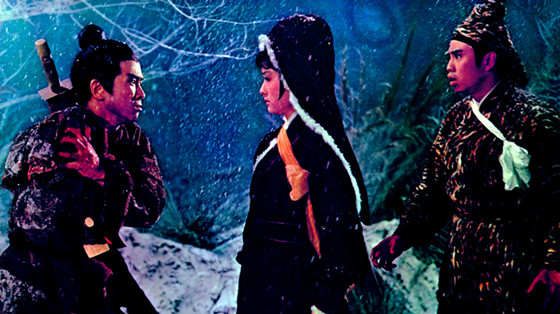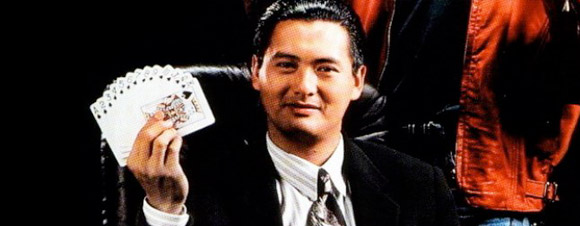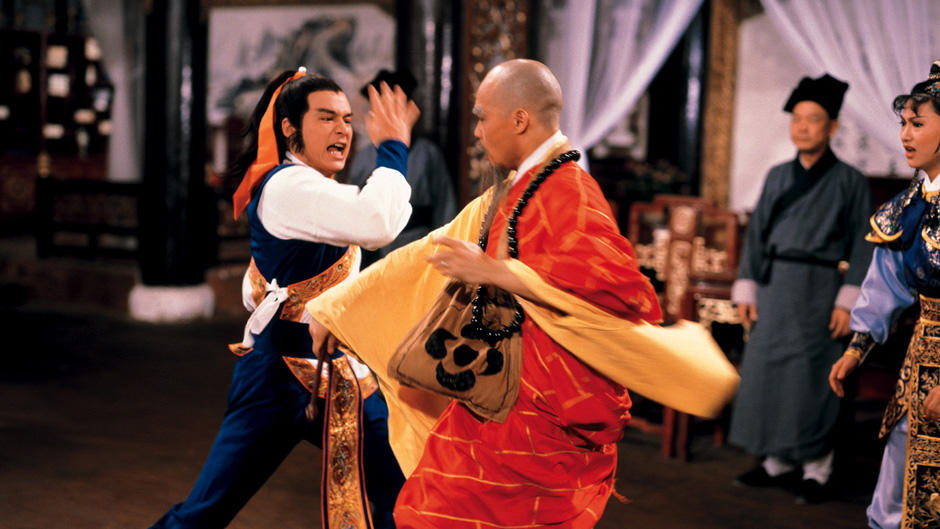14. Dr. Lamb
The Story:
An accused killer (Simon Yam) is brought in by the police, along with members of his family, after being caught with photographs of a recently deceased woman. The killer refuses to give up any information, even after being violently interrogated, and it is only when his family is apprised of the nature of his crimes that he finally comes clean. As police listen, he describes the homicides, and things only get worse as investigators uncover more of the physical evidence.
Why You Should See It:
Based on the real life 1982 case of Hong Kong serial killer Lam Kor-wan, known as The Jars Murderer and The Rainy Night Murderer in the local press, Dr. Lamb sticks fairly close to many of the details of what took place: the killer often photographed or filmed his female victims postmortem, and went so far as to preserve some of their body parts in jars.
As one can imagine, any film adaptation is going to be incredibly lurid, but Dr. Lamb (directed by co-star Danny Lee and Billy Tang) does a good job of not taking things too far overboard given the content, and although it isn’t without its sensationalistic and exploitive scenes, it’s not as gory or disgusting as it might be.
The story is told in two parts: the first half depicts the killer’s arrest and interrogation, and the second delves into the details of some of the murders in flashbacks. Yam’s performance reflects this shift in subject matter, starting out reticent and inexpressive and moving gradually further into howling madness and depravity. Stylishly directed and excellently paced, the film takes its material seriously, with only occasional touches of gallows humor.
There is an unmistakable Taxi Driver influence as well, as Yam drives his cab in the rain, awash in colorful neon light and jazz music similar to Bernard Herrman’s score from Scorsese’s film, searching for new victims. Helpfully for the audience, the presence of the detectives throughout provides a human, moral grounding as the killer’s tale unwinds, keeping the tone from getting oppressively dark. Highly recommended for fans of Seven and Silence of the Lambs.
13. Diary Of A Serial Killer
The Story:
Lau Shu Bill (Chan Kwok-Bong) sits in jail regaling his cellmates with the details of his exploits: he is a notorious serial killer convicted of murdering 14 prostitutes. He seems driven by the belief that if he kills these women, he’ll be freeing them from an immorality and allowing them, through the suffering that he inflicts, to be reincarnated into a better life.
But even as he sinks further into deranged homicidal madness, a distant relative of his wife’s gives him a new focus, a strange sense of forgiveness for himself despite his horrible crimes, even as he awaits execution.
Why You Should See It:
It might seem odd that I’m including Diary Of A Serial Killer in such close proximity to Dr. Lamb, but I think that watching both films provides an opportunity to see two very different interpretations of the same notorious murder case that shocked the public back in the early 80s.
The influences here lean heavily toward Hitchcock, very obviously in a part that mimics the shower scene from Psycho, and a little less so in scenes that appear to be inspired by Frenzy. The tone also reflects Henry: Portrait Of A Serial Killer in some respects, most notably in the way the killer befriends a troubled young woman for whom he has conflicted feelings, with other elements taken from the 1980 slasher film Maniac (Lau Shu Bill applies pieces of his victims’ skin to a mannequin he keeps in his bedroom.)
It’s definitely more of an exploitation film than Dr. Lamb, mixing much more humor with the (somewhat less) gory killings, but it can’t be said to be without its merits. It moves along quickly—reflecting the overall HK film industry sentiment of never letting an audience get bored—and while it revels in the typical trait of HK cult films of the time, what happens onscreen is just a hair too campy to be taken entirely seriously.
And as B-grade as some of the proceedings are, there is enough character development to engender feelings of sympathy or pity for the protagonist, even as he goes about the business of being a serial killer. There’s even a bit at the end that hints at Bill’s own desire to be freed from the torment of what he is—his own karmic second chance, if not forgiveness.
12. The Untold Story
The Story:
Anthony Wong, in a performance that won him the best actor Hong Kong Film Award, portrays a violent, deranged loser who flees the police in Hong Kong to Macau, and begins working in the Eight Immortals restaurant owned by the family he lives with. He murders them and assumes ownership of the establishment, explaining to anyone who asks that they sold him the place and moved away.
The full story behind what took place is far more gruesome, as local police eventually discover, and as the investigation proceeds, the shockingly horrifying truth of what went on during and after the killings comes to light.
Why You Should See It:
Movie about serial killers appear to have been popular around the early-to-mid 90s in Hong Kong, and this one does not disappoint. Untold Story explores the full spectrum of what can be gotten away with in a cult thriller, and unlike similar films on this list, there are scenes that are undeniably hard to watch, particularly the brutal rape/murder of a waitress hired by Wong after he takes over the business.
What it does have in common with some other cult crime films discussed here is a tendency on that part of the filmmakers to soften the blow of the subject with odd comedic choices, in this case to intersperse broad, almost slapstick comedy with flashbacks of ghastly killings.
As in Dr. Lamb, Danny Lee plays one of the detectives. Also like that film, the script is apparently based on a true story. The story structure is similar, as well, indicating that there was a type of convention being respected among these films that was expected by the audience, or at the very least considered by the producers to be a winning formula for success.
Anthony Wong gives a riveting and disturbing performance as the killer (he’s generally quite good at portraying villains). For those with a strong stomach and a love of the macabre, this is an interesting film to check out.
11. Fong Sai Yuk aka The Legend Of Fong Sai Yuk
The Story:
Kung Fu expert Fong Sai Yuk (Jet Li) falls for the lovely Ting Ting during an athletic tournament, but her father Tiger Lui has other plans: he stages a kung fu competition in which anyone who can beat his wife in a fight will win his daughter’s hand in marriage.
Fong loses (pretty much on purpose, not knowing Ting Ting is the prize), but his mother steps in—dressed as a man and posing as his brother—to win, and inadvertently causes Tiger Lui’s wife to fall in love with her. Further complicating matters is the fact that a Ching Dynasty governor is seeking out a list of names that will reveal the identities of the members of the rebellious Red Flower Society, one of whom just happens to be Fong Sai Yuk’s father.
Why You Should See It:
What set Hong Kong martial arts films of the 90s apart from what had come before was the incorporation of tightly edited action sequences utilizing shots that are numerous, quick and varied, and intensive wire work. Director Corey Yuen makes full use of the style in Fong Sai Yuk, running star and executive producer Li through a demanding regimen of jumps, flips, kicks, pole fights and flying in the lead role.
The humor can be a bit hit or miss, though it hits more often than not, and the dazzling action keeps things going at a good pace. Listen for the gag at the end referencing God Of Gamblers.
Those who haven’t seen many of Jet Li’s older films and are interested in his filmography should really stick to the work he did during this period in Hong Kong; even the best of his Western-produced films pale in comparison to the likes of the first three Once Upon A Time In China installments, Swordsman 2, Fist Of Legend, High Risk, Tai Chi Master, and this film and its sequel. It wasn’t until he went back to making movies in China and starred in stuff such as Hero, Fearless and The Warlords that he started producing worthwhile films again.
10. One Armed Swordsman
The Story:
An orphaned boy (played as an adult by Jimmy Wang Yu) is put under the care of a master swordsman, whose other students grow jealous of his superior fighting skills and resentful that someone from such a humble background should be studying alongside them. He decides to leave, but a woodland confrontation with two other students and the master’s daughter leads to him losing an arm.
A farmgirl and her father find him and nurse him back to health, and with the help of an old, partially destroyed martial arts manual, he learns how to fight again with only his left arm. Just in time, too: his master is being stalked by a former rival, who has developed a technique that can defeat the old swordsman’s style, and is using it to kill all of his students.
Why You Should See It:
The grim bloodiness that came to be standard fare at Shaw Brothers in the 70s is generally thought to have had its start here, in the film that made a star of Jimmy Wang Yu and launched one of the most iconic characters in martial arts films.
One Armed Swordsman was followed at least three sequels (depending on how you’re counting—he made guest appearances as well in other films), not all of which starred Wang Yu, though he did take the idea and create the One Armed Boxer, just to keep the momentum going.
In the Five Deadly Venoms entry I mentioned how later Shaw Brothers movies are rougher around the edges than their films from the 60s and early 70s; One Armed Swordsman is a perfect example of that difference. Though it’s shot mostly on indoor sets like the later films, it’s lit and staged far more convincingly, with sunsets and snow-covered forests evocative of a mythical fantasy world informed by actual Chinese history and locations; even the painted backdrops of mountains give a subtle impression of a larger landscape beyond.
Director Chang Cheh also shows a stronger sense of story subtext here, with Wang Yu’s character inheriting a broken sword the foreshadows the subsequent loss of a limb, and later going head-to-head with a villain called Long-Armed Devil, an ironic counterpoint to how one might describe Wang Yu’s condition.
What’s interesting is that the more Wang Yu loses in the film, the stronger he becomes, while his adversaries, in an attempt to augment their strength with gadgets and trickery, eventually fail. A good, character-driven story with some terrific action.
9. God Of Gamblers
The Story:
A world-famous gambler (Chow Yun-Fat), while helping a client to win an illegal gambling competition, suffers a concussion that reduces him to a childlike mentality, but doesn’t take away his gambling instincts.
Andy Lau plays a small-time con man who discovers him and tries to use his abilities to win big in different gambling establishments, but the situation is complicated when Chow’s former partner plots against him, and a gangster starts putting pressure on Lau and his friends to repay a debt. The only hope is for Chow to regain his memory and take part in a high stakes card game that will determine everyone’s fate.
Why You Should See It:
Wong Jing, a filmmaker better known for using extreme crowd-pleasing tactics in his movies restrains himself admirably with God Of Gamblers, a film that is a little bit James Bond and a little bit Rain Man, with touches of Woo-esque heroic bloodshed and martial arts stunt work just to keep it all interesting. Action fans accustomed to seeing Chow Yun-Fat in serious action roles might be pleased to see him putting in a comedic turn here, opening the door for some good slapstick.
The film looks terrific, and while the run time is slightly over two hours (somewhat long compared to many motion pictures from Hong Kong), the length is barely noticeable. Action scenes, while not wall-to-wall, are effective and exciting—a chase across two sections of bamboo scaffolding is especially memorable.
The best part is that it isn’t necessary to know very much about gambling to enjoy the story, because pretty much every victory is won through elaborate cheating, and the gambling scenes are handled with a combination of camera work similar to Scorsese’s The Color Of Money and solid acting. Followed by four sequels.
8. Eight Diagram Pole Fighter aka Invincible Pole Fighter
The Story:
A Song Dynasty general is betrayed by a traitor within his ranks, resulting in his death in battle and that of all but two of his sons. Of those two, one returns home, driven to the brink of insanity by the tragedy. The other flees to a Shaolin temple, where he begs to be allowed to become a monk, though the abbot has serious misgivings about counting such an intense and vengeance-driven man among their number.
While he tries to adjust to the monks’ non-violent ways, he works on a unique style of pole fighting adapted from his own martial arts training. When he hears that his sister has been captured by enemy forces, he leaves to rescue her, even though doing so might damn him as both a monk and as a man.
Why You Should See It:
Lau Kar-leung, who also directed classics such as The 36th Chamber Of Shaolin and Legendary Weapons Of China, once again proves why he was one of the strongest directors to work at Shaw Brothers. It differs from some of his other films in that the tone is unrelentingly downbeat, owing perhaps to the fact that popular co-star Alexander Fu Sheng died in a car wreck during filming.
Gordon Liu gives a powerful performance as a wronged warrior torn by a competing desire for revenge for the sake of his family and the detachment he needs to begin the process of healing. He is a man who has become displaced in the world, bereft of his family and too overwhelmed by violent urges to live in the society of monks.
Lau is no stranger to staging great action scenes—being himself a martial artist and veteran fight choreographer—and he doesn’t disappoint with Pole Fighter’s legendary, high-flying finale, wherein we see that Liu’s character, however much he has tried to internalize the temple’s Buddhist teachings, is sadly doomed to be a man traumatized by death and revenge.
